fifty-three: death is coming for us all, but not today
This month’s title from a song I found via Greg Davies’s Desert Island Discs episode and was immediately smitten.
It’s more triumphalist that I admit I was feeling at multiple points this month, but every time I hit “It's alright, I've fought more wars than I've had hot dinners / Sure you have, but the key to peace lies within us / and we'd already have achieved it / if everyone was as enlightened as me,” I faceplant, snickering. Quelle mood. It’s good for us, understanding our foibles.
It’s been very hot and torrentially stormy by turns — the river flooded and drowned the highway, twice in one week and then again yesterday — and between that and the march of deadlines, it’s the kind of weather that demands a slowdown. Mid-month, I took a week just to sleep and then a week and a half doggedly devoted to cleaning all the unfinished thoughts, tasks, waiting things, debris, and open parentheses out of my overpopulated head. The second very clearly required the first. I very clearly required the second. I’m still, bluntly, working that patch, and might be for a few weeks more. Somehow, a lot of nearly-done materia has accreted. The brain’s clogged.
I don’t know where the summer’s going, or why I don’t get more of it. Four to six more weeks between August 15 and September 1st would really do me fine right now, and sadly time insists on being linear.
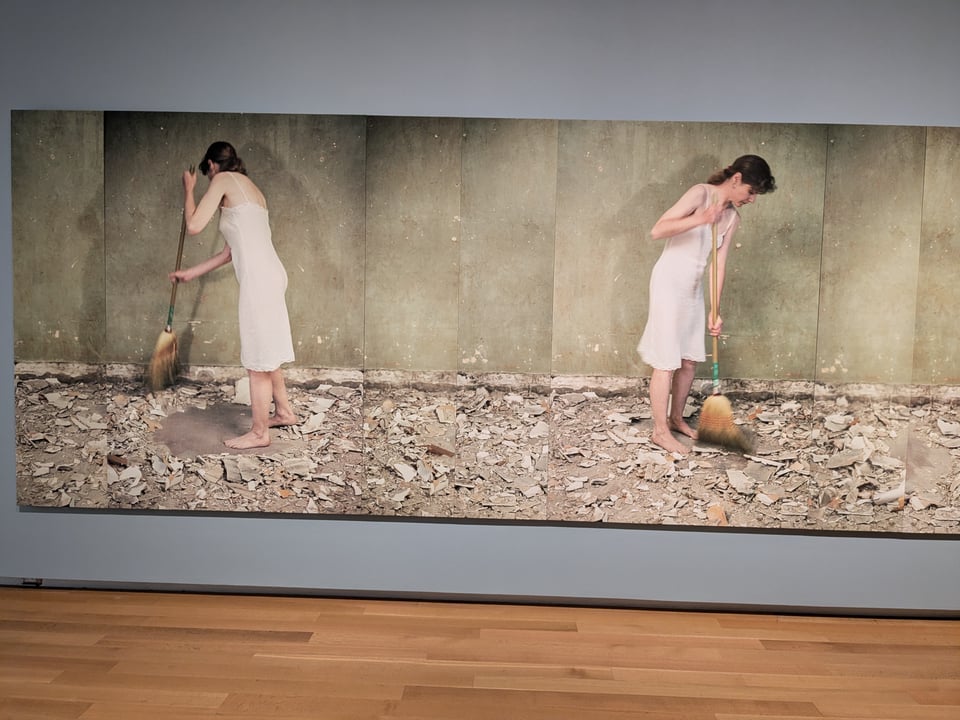
a variety of learning experiences, some unplanned
I’ve wrapped up the first Food Security course, and it’s proved a learning experience on multiple levels. There are some places I’ve found the limits of my instincts; there are some where I’m looking or moving in ways someone else can’t (for whatever reason) imagine, and they’re busily and rather frantically telling me I’m missing it, or wrong, because — well, they can’t see that particular trick of light. Except: their inability to imagine it doesn’t make it less real.
So there’s been a running disagreement about how the flaws I keep pointing out in these models — the way they leave so little room for spectra of behaviour, for human strategy — say something about the models themselves. But that’s a coping strategy, not the model, the professor says, and — yes? If the model doesn’t encompass the tradeoffs, the coping strategies, the countermeasures, the animate ways we navigate the frameworks we live in, it’s not the model. It’s a dead sample of live people.
So we’re coming from very different perspectives, and we’re going to disagree about the value and limits of quantification. Sure, policy’s made on generalizations and stats, but that doesn’t mean (she says) we should for one minute forget that those things are a form of cosplay; they are not real. They do not reach back to reshape the real even when spoken into being. People just make different adjustments and compensations.
That clash of viewpoints surfaced in some interesting ways. We were asked, in the late lectures, to make a Rich Picture map of what factors impact our own household’s ability to survive and thrive — and I bluntly procrastinated on it, because I was too afraid of how it would look: a representation of everything that’s lining up to crush me and the people I love. That was sort of his point: That distant policy factors wreak hell on people’s lives, and how policy needs to be advocated for and made. (I don’t like that as a point. I graduated grimdark in my twenties.)
When I finally put my balls on and did it — I realized all the little arrows I was drawing were currents, and they schooled together, and what I was looking at was the places it pushes back. I was looking at the lineaments of my own strategy. And I was oddly thrilled by that: its instinctive shy away from certain unreliable systems, its concentration in a great deal of basic human trust, broad distributions, redundancies, skills, and care. I don’t tend to think of myself as a radical optimist; just a little doggedly attached to the not today part of the equation. I’m having to rethink that. I mapped my own tactics, and they spoke. While there is a valid reading that I’ve been excluded from extractive systems, I’ve also significantly already divested. And those aren’t the same.
Incidentally, the generous world keeps on giving — the real one, the one I’ve decided is realer. As the course ended (of course) Climate Grants Jury Duty has started up — and we’re back into the world of big generosities. There are 40 community project applications on my desk right now (thankfully we have a reading cap each this year because last year got intense) and my job for the next little while is to think about which are the most impactful and feasible. I have been so looking forward to this. It will be a chance to forest-bathe in Good Toronto’s collective ingenious badassery.
grab somebody that you love / grab anyone who needs to hear it
A large chunk of my month has also been sunk into writing that Communicating Climate Hope talk, through loops and iterations and an evening where I got a little hyper and decided the best thing was adding in some clips from one of the best Broken Social Scene videos. (They stayed in. It was still funny in the morning.)
It benefited from some late-breaking general title feedback and abstract-reading from multiple generous parties (thank you!), and involved long sifts through my old social media accounts, which I’m realizing I partly use as commonplace books (one old tweet: if time travelers prevented social media from existing, what would you do to fill the niche it’s occupying in your life? what are your alternative strategies? Mine is apparently a commonplace book.) Most of the thoughts I really wanted to put in here I’d workshopped in some form in those spaces, and so this turned into a slow gathering-together, like one hand across a loom, one on the weft. I filled up on it all on the laptop, late at night; rolled over; went to sleep; and woke up with the coherent connections forming. Tired is stupid, says Ursula Le Guin. Go to bed.
Now that I’m bluntly a little less scared of this (yeah, I think I can admit that) I’m really excited for what it’s blooming into. It won’t be so much news to You the Newsletter Crew, who have been playing along, but I think it’s coming together into something real here.
Talk goes down Friday August 16th at 2:30pm Pacific! It does get recorded. I’ll link the situation when I’m back, next issue.
it's not like there's gonna be nothing, is it?
As alluded to above, this month shit got indubitably real in the gardening sphere: everything into flower, and then everything into fruit. I found my first tomatoes the first week of the month; cucumbers in the second (proud of that: I’ve never managed them and there are buckets); Hakurei turnips breaching the soil like little white whales. Every day for weeks I pulled a fistful of beans and a fistful of sugar snap peas off the trellises and tucked them into fridge containers. The tomato plants are now also taller than my head. Abruptly, there was more than I could eat. (Not actually a problem: Pickling has entered the chat.)
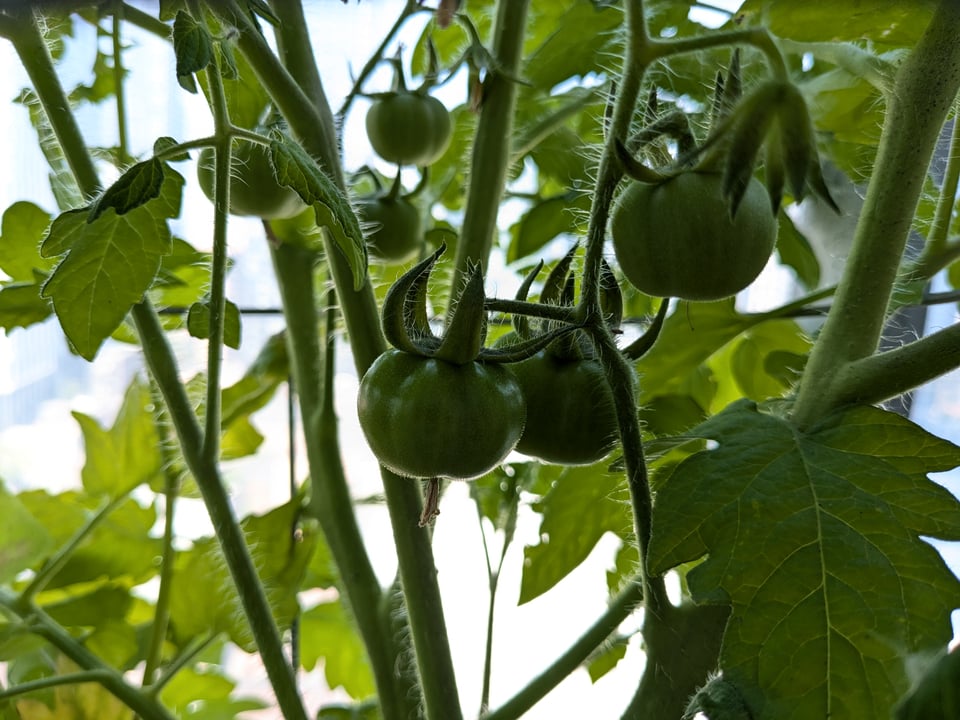
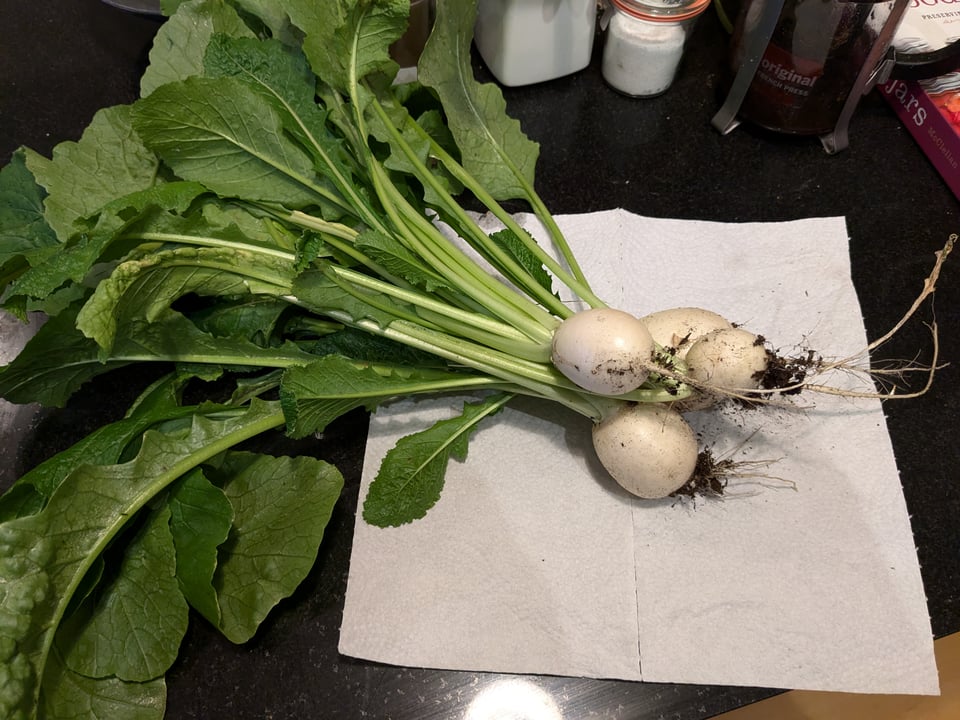
The legumes, especially, are reinforcing some globally positive little habits. With things like beans and peas, the plant produces a hormone to inhibit blooms once enough larger actual beans/peas are on the vine, so pick early, pick often is actually good practice. The more you just regularly harvest, the more it’ll bloom, and the more you ultimately produce.
So Beanspotting™ (I’m worth a million in prizes) went into the routine as the last thing I do, after weeding and watering: go through the tangled, riotous little mini-forests of leaves and vines climbing trellises and each other, and try to find the big ones.
Every day for weeks, I’d feel like there weren’t any, or only one or two I could see (it’s green on green) and every day, somehow come out with a handful. And there’s a trick to it: You have to stop looking so hard. You almost have to relax your eyes, take them out of focus, let the shapes come to you. It’s an odd little act of listening? Just try less, work with the plant a little. It is hard not to take this as more broadly applicable: Slow the hell down a little and meet this on its own terms. It’ll tell you when it’s ready.
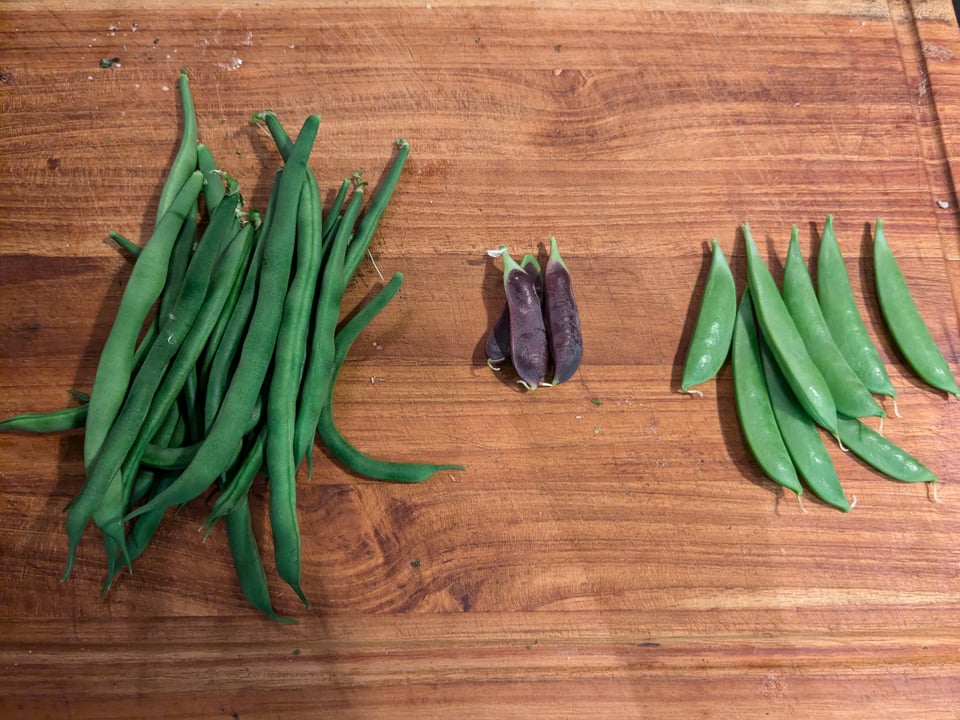
Nothing to challenge a haunting sense of scarcity like a persistent, infinite supply of fresh volunteer foodstuffs, and the knowledge that once something stops producing, you can just dip into your seeds and repurpose the space (half the pea plants came out this month; a lot of beets went in). Yeah, I spent a bunch on the inputs and I’m not even costing that out, because it’s multi-year infrastructure. This somehow worked. There’s absolutely enough to eat.
That’s been supplemented by more community measures. I did my first fruit pick of the season — a cherry tree that was absolutely bowed with fruit — on a cool Friday night. We took over 70 pounds of fruit off it and probably left as much up there on the too-high branches, after going half an hour over time, because the sun was going down and eventually you just have to stop.
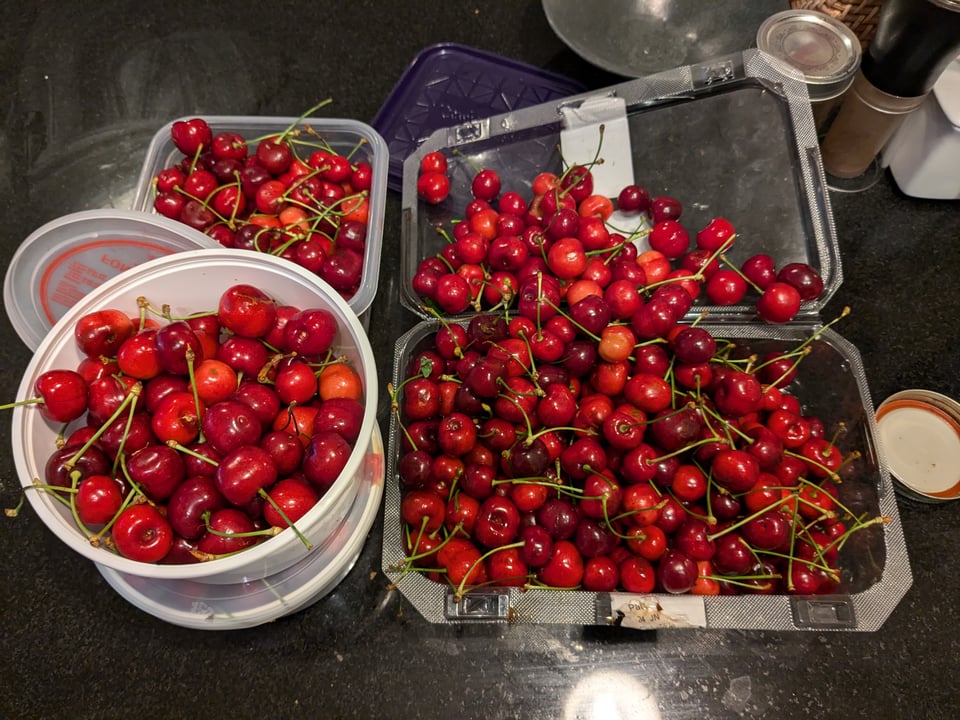
My back wasn’t happy with the picking poles, so for an hour and a half, I sat on a porch step sorting cherries and talking about people’s other growing and organizing projects as the wind worked its way through and around us, and it was the most truly and thoroughly in my body I felt that whole week.
I folded them into everything for the better part of a week — a cherry clafoutis, Hungarian meggyleves, an adulterated quinoa and kale salad with balsamic dressing, scones, and a batch of cherry vanilla jam — and still bartered a whole container with a community garden friend for a big bag of her other-garden greens and nasturtiums, because I was low on lettuces that week. This is a calendar that kind of sinks into your skin. I’m liking letting it.
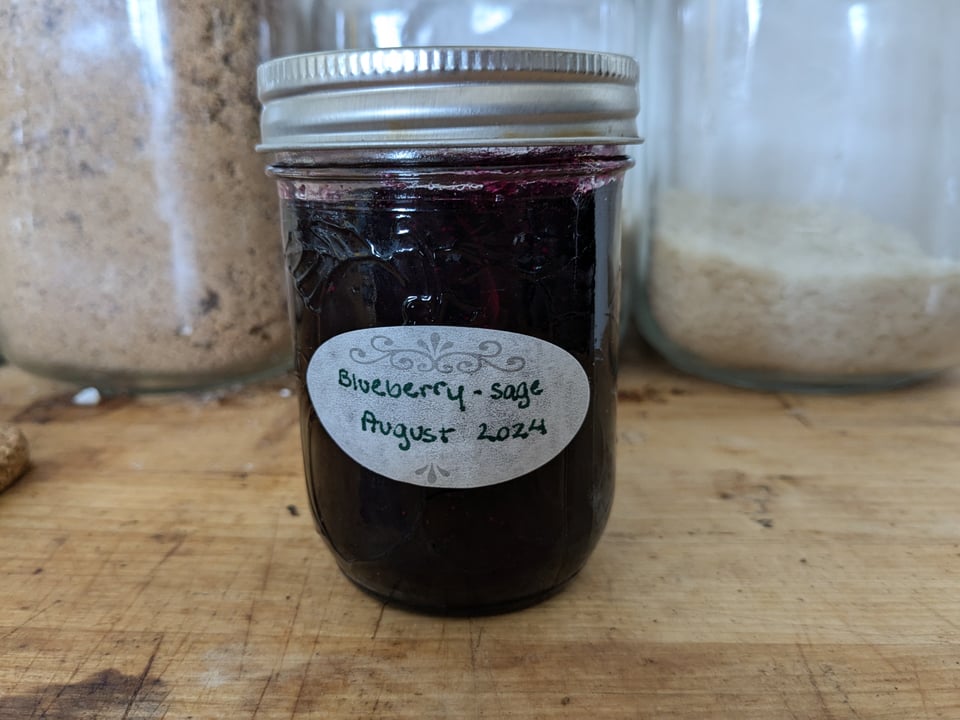
words
I’ve been straight-up itchy and annoyed at the all-causes lack of wordcount around here (which is usually the problem: I drop it frequently to do other things, because I have to, because abstract and symbolic lives are both impossible and inadequate. But then I itch).
The itch was one of the places the current bout of Finishing Things stemmed from: wrapped up some so-close poem drafts, the ones that were hanging on finding three precisely right words, and the words might not actually be extant in English yet. Started a few new ones, with the same issue. This is a lifelong problem here, which I don’t actually know if other people have: hunger for a word with very specific dimensions which may not fill any social contract or communicate, except that it knows the insistent space under my ribs, and that space knows it. It’s a bit like being last speaker of a language sometime, or maybe the first of one. I think poetry helps and yet doesn’t help the matter, because I’ve started to think poetry is the refuge of people who have got a little tired of explaining themselves.
Food for scant words this month has included: A hefty bag of Rogue Wave Peruvian coffee; blessed dark thunderstorm days where the rain and cool light lies over you like a blanket; cherries (natch). It’s not really enough but I am trying to be patient with that, because there has been so much to do. But the ergonomics didn’t work this month, and I’m planning the adjustments. Experiments and failures; you pick yourself back up. And the one poem I did definitively finish? God. Might be the (new) best thing I’ve ever done. Might have all been worth it. :)
things read
I got through one read this month: Emma Healey’s memoir Best Young Woman Job Book. Reading her second poetry collection Stereoblind on Queen West, in line for the stationery show on a late-winter Sunday, is one of those last clear-glass memories I have of calm, just-pre-COVID life; I’m inordinately fond of it besides it just being a good book. And Best Young Woman Job Book has the same clarity of prose — a way of writing imprecision that makes it clear that imprecision is a choice. It’s a writing life memoir through the framing conceit of all the other jobs Healey held to afford poetry, and a not entirely subtle look at the financial and human cost of putting together a writing career.
I should note: If you spent any time in the Literary Sexual Abuse Wars (good god, pour one out for all our dead soldiers and the ridiculous amount of pain and time wasted) the section where she details some long-term exploitation by a notably older university writing professor — with telling detail, but enough distance to not cut readers’ throats as they swallow — will range from hard to just the same old exhausting. Everyone is anonymized; I do know exactly who she’s talking about, because I know people who were also assaulted at Concordia Creative Writing, and it was a fairly big deal when it broke surface. The lists of names in CanLit are just as long as they are in genre; it’s unfortunately just as sad and just as squalid, people have just as little competence in dealing with it, and when you figure out just how much damage needs to interact to produce this working culture of trying to fill the starving places inside with younger people’s bodies, ultimately just as stupid. You wonder, later, how much wouldn’t happen if people just took a deep breath and said: I feel. I need.
Digression aside: For a younger person’s memoir (she’s only 33) it’s self-aware and deliciously readable, written in the studied and smooth prose of a prose poet, and has some astute things to say about the gap between the romanticized trajectory of working artists’ lives and the actual. If it’s content you can handle, it’s well worth a weekend.
**
This thing always gets less interesting when I’m up to my face in work (sorry), and I don’t see that getting much better for the rest of August (sorry). But I’m off to Vancouver for the conference next week. I will bring back something of the ocean.